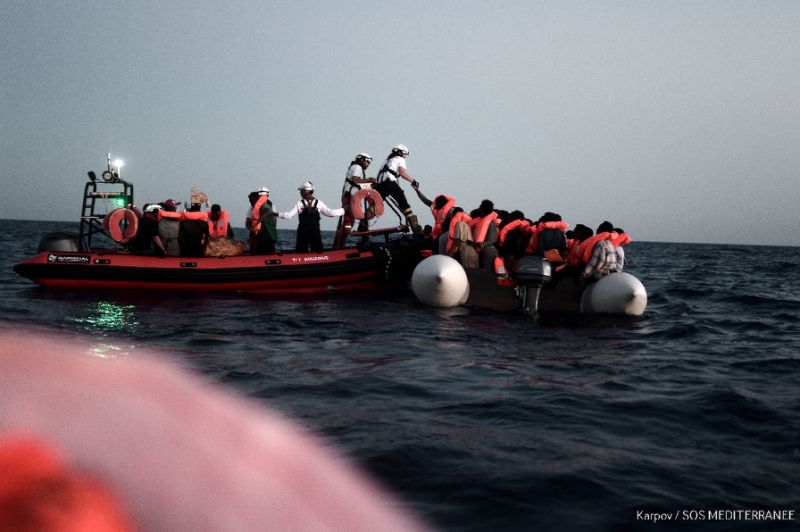Last week, Italian Interior Minister Matteo Salvini presided over the closing of a migrant reception center in Mineo, Sicily. The closure was an important move, long-awaited by groups on the left and right. Yet, the shutdown of CARA di Mineo at this particular moment is also problematic: rather than signaling improvements in Italy’s migrant reception system, it relocates many of the residents to other precarious situations, and it feeds momentum behind a racist, nationalist campaign to close Italy’s borders to poor, Black foreigners.
At the height of Europe’s “refugee crisis,” the CARA di Mineo was among the E.U.’s largest migrant reception centers. In 2014 it housed over 4,100 asylum seekers – more than twice its actual capacity – who awaited decisions on their applications for protection.
In recent years, the center has repeatedly been in the news, as management was indicted for mafia collusion, as sex trafficking rings were uncovered, and for the degrading conditions in which center residents had to live.
Paradoxes of Italy’s Migrant Reception System
Since its opening in 2011 under the Silvio Berlusconi administration, the CARA di Mineo has represented the paradoxes of Italy’s migrant reception system. Like elsewhere in the country, locals both resisted the arrival of foreigners and found work in reception – significant in a region with high unemployment rates. The CARA, which occupied a former U.S. Navy housing complex near the city of Catania, exemplified Italy’s response to the migration “emergency” marked by increased Mediterranean migration following the Arab Spring.
This model was expanded in 2014, as arrivals increased. Nationally funded, regionally administered, and locally managed, such centers provide basic services to recently arrived asylum seekers, some offering more robust programs than others.
In his press conference in Mineo, Salvini claimed that closing the CARA would “return this area of Sicilian territory to Sicilian citizens,” essentially blaming Mineo’s problems on migrants. But for those who worked there, the closing represents unemployment. Last week, Mineo’s now-former employees protested the shutdown with the support of national labor union CGIL. Some speculated the closure would affect at least 1,000 locals, including direct employees and businesses that supplied the CARA.
Migrants and migrant rights groups, instead, had long called for the center’s closing, protesting unsanitary and unsafe living conditions, lengthy waiting periods for asylum hearings, and corrupt management practices, for example when staff paid migrants their €2.50 ($2.80) daily allowance in cigarettes instead of cash.
Italy didn’t close the center while its management was investigated in 2015 and 2016 for connections with Mafia Capitale, the Rome-based criminal operation that siphoned public funding for private gain. Instead, authorities militarized the area and continued to send disembarking migrants there for processing that took months or years.
Salvini’s Framing
If Mineo’s 8-year operations represented the dark underbelly of migrant reception, the center’s closing should be a welcome move. But for Salvini and his supporters, closing centers is one iteration of efforts to close borders.
The narrative they promote through this closing does little to assuage concerns about migrant well-being or local employment and instead furthers the right-wing leader’s message that migrants are a threat to national security and the safety of local communities.

Rather than using Mineo as an opportunity to implement and expand better reception models, Salvini lauded the center’s closing as bringing an end to Nigerian drug and prostitution rings, and to migrant-instigated violence and degradation. His comments affirm racist associations of African migrants, who comprise a majority of those reaching Italy, with violence and criminality.
While Salvini rightly condemned conditions at Mineo, he said nothing about asylum, referring to center residents with the derogatory term “clandestini,” wrongly implying that asylum seekers and refugees are in Italy illegally.
Closure of the CARA di Mineo
The haste with which this long-anticipated closure was finalized has placed some of the center’s most recent residents in further precarity.
Such closings should be a delicate operation: migrants awaiting formal protection have often experienced trauma in their countries of origin or along their journeys. As documented by Italian humanitarian NGO MEDU, Mineo residents often included survivors of torture and enslavement in Libya. They arrived with physical and psychological wounds and needed immediate and regular care.
In preparation for closing the Mineo center several months ago, new management cut staff, including most medical personnel, and began transferring residents to other centers in Sicily and Calabria. But some ended up in centers with what they described as even worse conditions, so much so that they made their way back to Mineo and essentially lived in hiding.
In its statement, NGO MEDU condemned authorities’ abandonment of 30 migrants who would have been left homeless had a local bishop not stepped in, and the hurried transfer of the CARA’s last residents to nearby centers without waiting for better accommodations to become available.
Migrant precarity is not unique to Mineo; recent evictions in Rome are a reminder that homelessness remains a significant issue for immigrants and asylum seekers throughout Italy.
Salvini’s claim that the Mineo closure signals an emphasis on smaller reception models is suspect: Italy’s small, positive models were among the first victims of the interior minister’s campaign to criminalize migration and humanitarian efforts, including his publicized attacks on reception in the Calabrian village of Riace – once celebrated as Italy’s most successful reception site – and the village’s former mayor Domenico Lucano.
Anti-Immigrant Crusade
Last week’s rush to close the Mineo center coincided with several setbacks for Salvini’s La Lega party and the right wing’s ongoing anti-immigrant crusade. Tuesday’s press conference likely distracted from the news of La Lega’s alleged Russian dealings, and the CARA’s closing temporarily topped news that asylum seekers are still arriving in Italy, despite Salvini’s insistence that ports are closed.
Since assuming office last summer, Salvini has worked to criminalize irregular migration and rescue operations, with revisions to his security decree currently in discussion. The decree, essentially unchallenged by the E.U., dangerously conflates rescue with human trafficking and promotes the disproven “pull factor” myth that rescue operations promote precarious migration. Sea-Watch Captain Carola Rackete will return to court this week on people smuggling charges. Although the Sea-Watch and other ships have since docked and disembarked, the practice of closed ports calls into question international conventions, the law of the sea, and the right to claim asylum.
The captain speaks. 🚀#CarolaRackete #SeaWatch3 pic.twitter.com/EFjTYA6YXS
— Sea-Watch International (@seawatch_intl) June 28, 2019
Meanwhile, migrants fleeing dangerous conditions find themselves trapped in the midst of Libya’s civil conflict and sometimes returned there, thanks to the Italy-Libya border control agreement. While arrival numbers have decreased, the rate of death remains high: currently, more than one in ten migrants attempting the crossing dies.
Modifying or closing the CARA di Mineo was necessary; however, its celebrated closure does not align with a reform of migrant reception but rather with the closing of ports. We should understand this political use of the center’s closure as part of a campaign that enacts a violent logic: Italy knowingly abandons asylum seekers to poor living conditions or death in Libya or at sea. Bolstered by anti-immigrant racism, Salvini justifies these moves by blaming the victim.
Disclaimer: The views and opinions expressed here are those of the author and do not necessarily reflect the editorial position of The Globe Post.




















